News & Events | About PKU News | Contact | Site Search
Peking University, Apr. 16, 2011: Two days after the UN Security Council adopted a resolution to authorize a no-fly zone over Libya on March 17, 2011, coalition forces launched strikes against Libya. The legitimacy of the strikes, the interests and intentions of Western powers, and the future of both Libya and the Gaddafi regime, among other issues, have since been the source of much debate. China's interests and positions have also been a source of great concern, particularly in light of its growing economic engagement with African countries. .
PKU News interviewed three scholars from the School of International Studies (SIS), Peking University on key issues concerning recent developments in Libya.
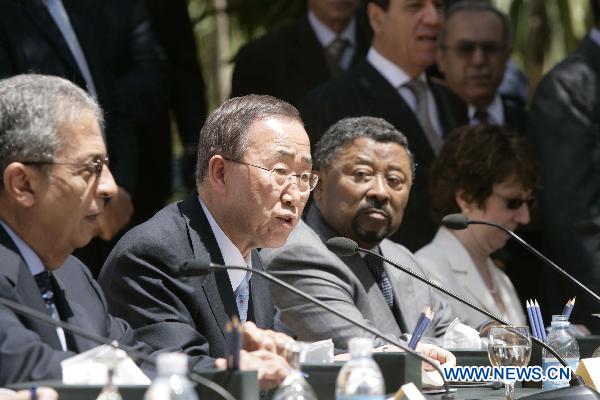
UN Secretary-General Ban Ki-moon (2nd L) speaking at a news conference at the Arab League's headquarters in Cairo, Egypt, Apr. 14, 2011. Ban Ki-Moon reiterated on Thursday that a ceasefire was needed to resolve the Libyan crisis and ensure the rights of the Libyan people. (Xinhua/Nasser Nouri)
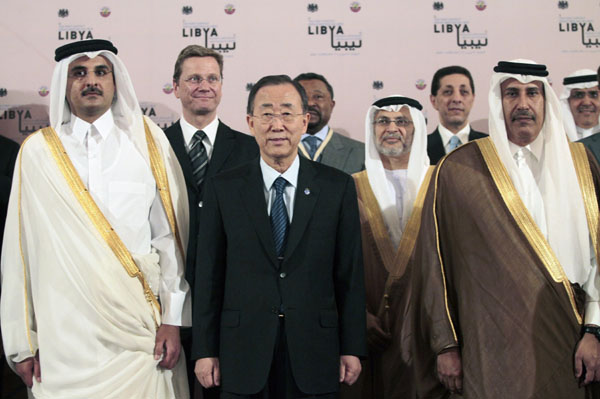
UN Secretary General Ban Ki-Moon (C) with Qatar's Crown Prince Sheikh Tamim bin Hamad al-Thani (L) and Qatar's Prime Minister and Minister of Foreign Affairs, Sheikh Hamad Bin Jissim Bin Jabr Al Thani, before a start the first international contact group meeting on Libya in Doha, Apr. 13, 2011. (Xinhua/Reuters Photo)
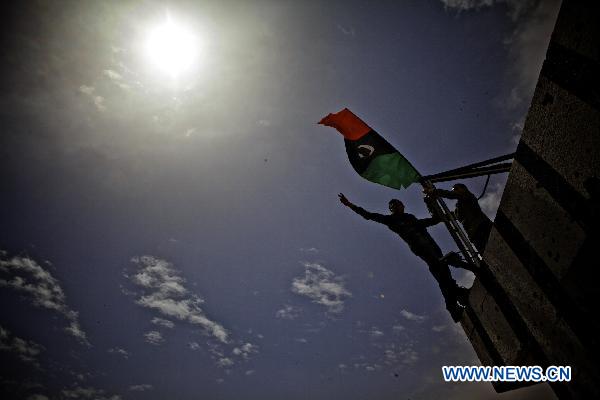
Rebel fighters raise the Kingdom of Libya flag in the west entrance of Ajdabiya, Libya, Apr. 15, 2011. (Xinhua/Cai Yang)
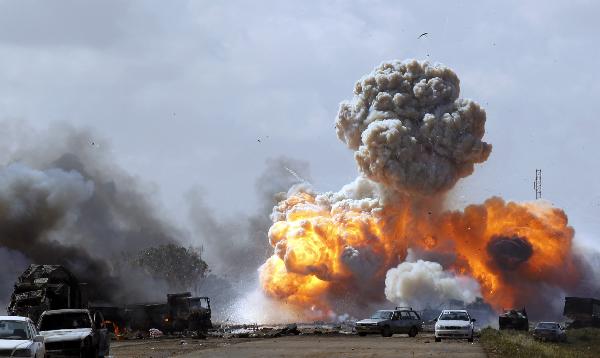
Vehicles belonging to forces loyal to Libyan leader Muammar Gaddafi are destroyed by a coalition air strike, along a road between Benghazi and Ajdabiyah, Mar. 20, 2011. (Xinhua/Reuters)
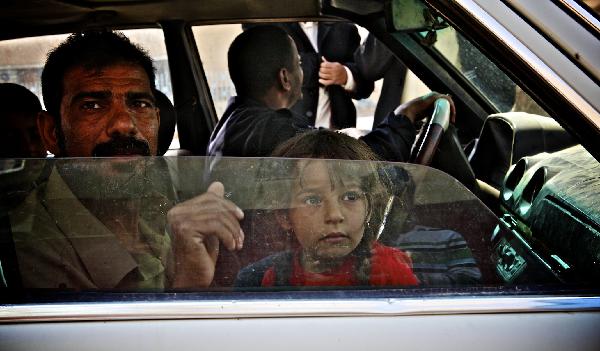
A girl, together with her father, looks out of a car window in Agedabia, eastern Libya, Apr. 7, 2011. (Xinhua)
France: A Two-Level Game
Much attention has been paid worldwide to France’s leading role in military attack against Libya. According to Professor Wang Lian and Professor Jia Qingguo, the reasons behind its aggression are mostly related to its domestic politics.
Professor Jia Qingguo pointed out that facing the upcoming presidential election in 2012, French President Nicolas Sarkozy is anxious to reverse the decline of his popularit among the French public and regain the political advantage in the coming election through leading the attack against the Gaddafi regime in the name of humanitarian intervention. Almost all parties in France have backed Sarkozy's decision on Libya, indicating that his policy has gained general approval in France's political circle, according to Professor Wang Lian.
Professor Wang Lian also highlighted the other two factors. First, France’s unsatisfactory performance dealing with political upheavals in Tunisia and Egypt, as well as close personal ties between French political elites and North African leaders which were revealed earlier, are both urgent concerns for Sarkozy to handle with through improving France’s international image. Second, the stability and cooperation of Libya, an important power in western Mediterranean Sea region, are vital to the French push for the Mediterranean Union. Amid Libya’s domestic war and escalating humanitarian crisis, Gaddafi appears to have failed to fulfill this regional role, and France apparently gained high-sounding reasons for utilizing military means.
Professor Wang Yizhou further characterized France as a second-level great power in today’s world. Ever since the age of President Charles de Gaulle, France has been quite unique in dealing with NATO-related affairs as well as other issues concerning its foreign policy.
The US: The Role in Dilemma
Compared to some other countries and its previous performance in Afghanistan and Iraq, the US has seemed to act more cautiously in Libya this time. The scholars also analyzed its considerations during the interview.
Professor Jia said that the US was cautious because it had been successively involved in wars in Iraq and Afghanistan during the past 10 years with huge costs and few achievements. On top of this,many Americans, caught in the middle of an economic recession following the financial crisis, are strongly opposed to being dragged into another costly war. This is an important consideration for Obama and Clinton, although they believed that the US should take the lead in the war out of “humanitarian” considerations.
Professor Wang Lian gave further explanations. Although Libya is of limited strategic importance compared to Northeast Asia, Iran, and East Asia, the US cannot keep itself out of the affair due to its leading role in the western world. Libya’s unstable situation may affect neighboring countries including Egypt, Tunisia, and Algeria; continuing American dominance in the Middle East has forced the country into this position. Since Obama is committed to withdrawing American troops from Iraq and Afghanistan, more considerations are needed before hastily initiating an “Obama” war. The American stance is cautious, compared to Sarkozy’s apparent enthusiasm.
According to Professor Wang Yizhou, another reason explaining US’s caution is the importance of its attitude and position on Libya issue in NATO. Unlike former US President George W. Bush, Obama is trying to avoid initiating the third US-led war after that in Iraq and Afghanistan.
China’s Interest and Position
Professor Jia argued that China’s most important interest in Libya is restoration of stability as soon as possible, because the current political turmoil there jeopardizes China’s legitimate rights and interests. It also threatens stability in the Middle East, which is crucial to international energy security and the world’s economic development.
Professor Wang Lian further elaborated on this point, stating that in accordance with international law, and indeed basic morality China is within its rights to work to guarantee the life and property of Chinese people working and travelling in Libya, to ensure that bilateral agreements between China and Libya are not impaired due to the political turmoil, to safeguard the dignity of the UN and international law, and to object to the use of force.
Professor Wang Yizhou analyzed the issue from another perspective. With its expanding overseas interests not only in Libya but also in other parts of Africa, China should think over how it can better protect these interests and in what approach it can involve such issues more effectively. China’s involvement should be distinguished in nature from what the Western world has done. Right now on the Libya issue, China should remain contact with parties concerned in a constructive manner.
The Middle East: Way Ahead
How is situation in Libya influencing recent political turmoil in the Middle East? How will it affect relation between the West and the Middle East?
Professor Jia pointed out that the war in Libya make recent situation in Middle East even more unstable. Without additional measures to solve the problem, air strikes could only prolong the war. However, no country wishes to send ground forces to Libya for fear of getting trapped there, just as how the US has been trapped in Iraq. As a result, France, the UK, and the US are likely to remain cautious in military actions. In the meantime, if not handled well, air strikes may easily acerbate tensions between these countries and the Middle East.
Professor Wang Lian argued that the Western world will attempt to keep its political influence, economic interests, and reliable alliance after the radical changes in the Middle East.
According to Professor Wang Yizhou, the Middle East is now faced with a crossroad with its voice largely marginalized in international politics. Many complicated problems including political stability, economic development, social construction, and youth employment are yet to be addressed.
Extended Reading:
Anthony Yuen speaks at PKU on Libya
Reported by: Gong Ting
Edited by: Jacques